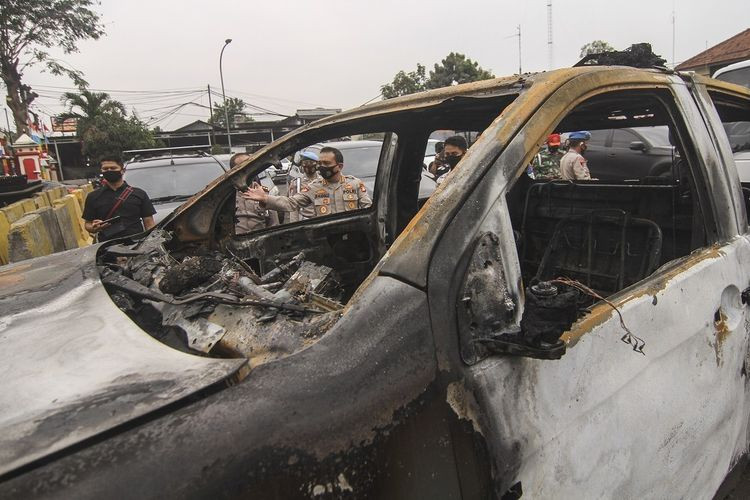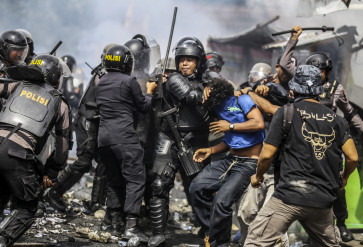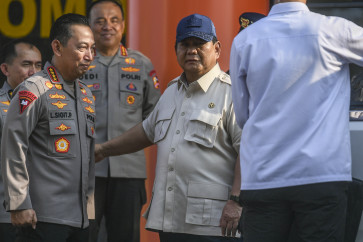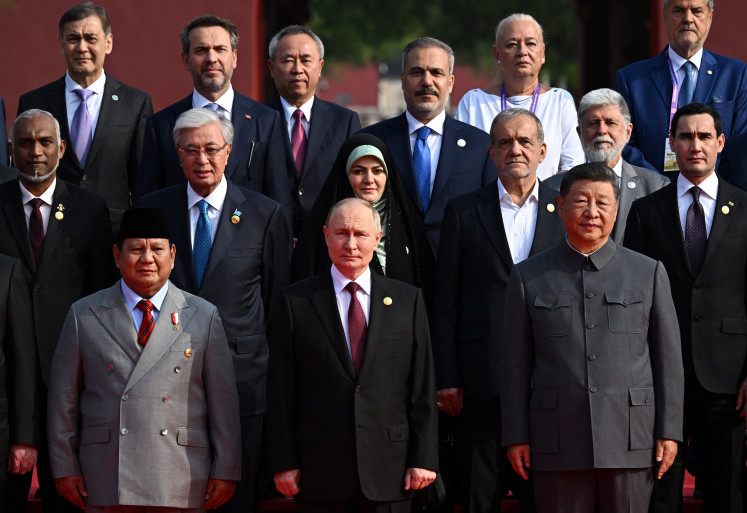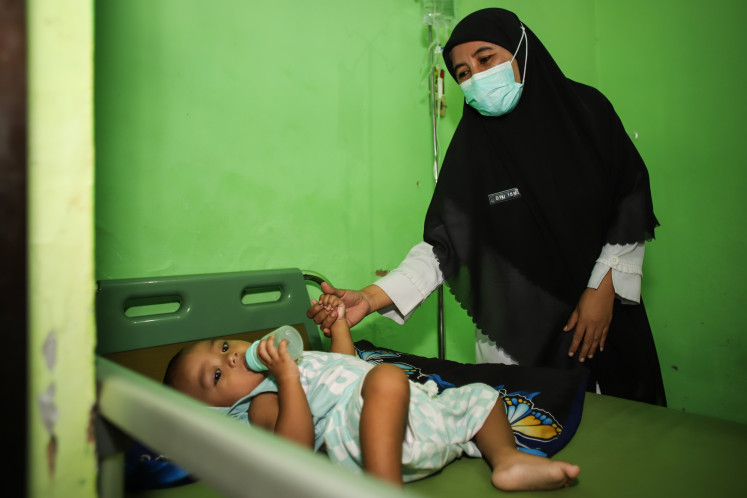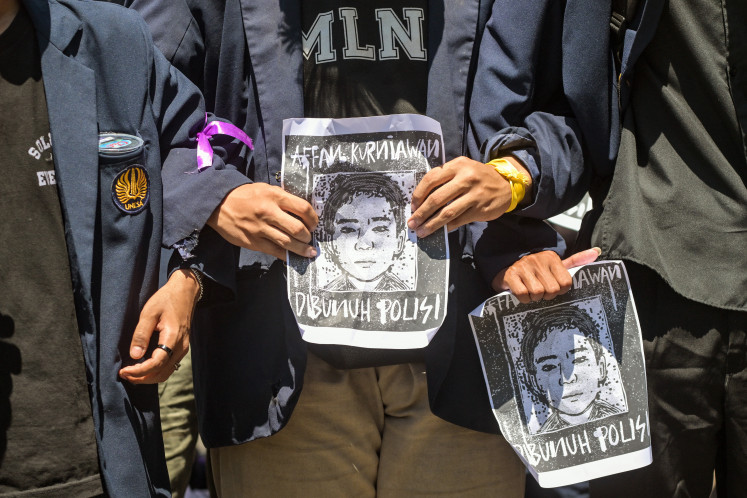Popular Reads
Top Results
Can't find what you're looking for?
View all search resultsPopular Reads
Top Results
Can't find what you're looking for?
View all search results‘Serious efforts’ needed to end TNI-police rivalry
Change text size
Gift Premium Articles
to Anyone
T
he government, the Indonesian Military (TNI) and the National Police need to make a serious effort to settle years of entrenched rivalry between the security and law and order apparatuses to prevent persistent tensions from triggering conflict and endangering the lives of civilians, observers have warned.
Critics have pointed to Saturday’s attack on the Ciracas Police station in East Jakarta as further evidence of the entrenched rivalry, after it was revealed that a false accusation had led to clashes involving personnel from both sides.
The attack was just one of countless clashes involving TNI and police personnel, said Indonesia Institute for Defense and Strategic Studies (LESPERSSI) analyst Beni Sukadis, which go back to the moment when sweeping security reforms broke apart the two institutions some 20 years ago.
“The attack [in Ciracas] may have been caused by misinformation, but I also believe that years of tumultuous relations between the TNI and the police might have also been the underlying reason for the incident,” Beni told The Jakarta Post on Tuesday.
The incident at the weekend occurred after an army officer identified as Second Pvt. MI provoked 27 fellow soldiers to lash out against police after he claimed to have been the victim of police brutality. It was later revealed that the officer had sustained his injuries from a single-vehicle crash in Ciracas on Friday.
It is not the first time the Ciracas Police station has been targeted.
In late 2018, dozens of TNI personnel reportedly ransacked and burned down part of the police station, damaging vehicles and leaving police officers and reporters injured. The attack was allegedly triggered by anger over the police’s handling of an assault on TNI personnel in Ciracas.
The TNI is likely to dismiss 31 army personnel involved in Saturday’s incident and will require them to compensate the victims for any injuries and losses suffered. Two police officers were injured in the attack.
Beni said low-ranking TNI and police personnel were easily provoked into physical altercations over trivial matters, indicating that both sides still fostered resentment toward each other.
Earlier this year, TNI personnel stormed a police station in North Tapanuli regency, North Sumatra, over a traffic dispute.
In September 2019, the two forces were involved in multiple clashes during mass protests in separate locations. Police officers allegedly fired tear gas at TNI personnel and the two sides were seen involved in a verbal battle among protesters, fueling speculation about tensions between the two institutions.
In November 2010, TNI and police personnel traded punches at a soccer match in Mattoanging stadium in Makassar, South Sulawesi.
The clash occurred after a TNI officer guarding the stadium refused entry to relatives of a policeman who was trying to smuggle them in without tickets.
For years, the government has tried to mend the divisions between the two institutions, to varying levels of success. Most recently, President Joko "Jokowi" Widodo ushered in a period of good graces when he appointed current Home Minister Tito Karnavian as police chief and Air Chief Marshal Hadi Tjahjanto as TNI commander.
The disharmony between the TNI and the police, Beni said, may stem from the decoupling of the two institutions, which then translated into a sense of envy.
In 1999, former president BJ Habibie separated the police from the military in a presidential instruction (Inpres), which led to TNI personnel losing their rights to hold strategic political and economic posts previously awarded under the dwifungsi (dual function) doctrine.
While strict limitations were imposed on the military, the police force flourished and garnered greater authority as a separate entity, which led to military personnel believing police officers received greater financial compensation.
“From what I have gathered in years of observation, that may be the reason why personnel from both sides are quick to escalate minor conflicts into major clashes,” Beni said.
Clashes between low-ranking TNI and police personnel have continued to occur partly because both institutions have failed to impose stern sanctions against those involved in altercations, said Husein Muhammad, a researcher at human rights watchdog Imparsial.
Both sides have resolved such conflicts through disciplinary actions instead of charging perpetrators with crimes, he said.
Such lenient treatment not only fails to create a deterrent effect but also paves the way for others to commit similar acts in the future, Husein said.
More importantly, further confrontations could result in the harming of civilians, he said. Both institutions have access to deadly firearms, which are prone to misuse the longer tensions drag on.
To prevent such conflicts from reoccurring, Husein called on lawmakers to revise the 1997 Military Court Law by adding a provision that military personnel found to have committed general crimes could be brought before criminal courts rather than being tried in military courts.
“I believe that revising the law will force the military to be accountable when resolving crimes committed by its personnel,” Husein said.
The TNI continues to insist that soldiers accused of crimes should stand trial in military courts.
Lawmakers have other ideas too.
Bobby Adhityo Rizaldy, a member of the House of Representatives’ Commission I overseeing defense, said the government should prepare a set of new regulations to complete provisions on the TNI’s scope of duties in military operations other than war, as a follow up to the 2004 Military Law.
He said doing so would assuage the envy between TNI and police personnel.
“Moreover, most of the conflicts involve low-ranking personnel from both sides, so I think it would be better to strengthen the sense of solidarity between them by carrying out more joint training,” Bobby said.

